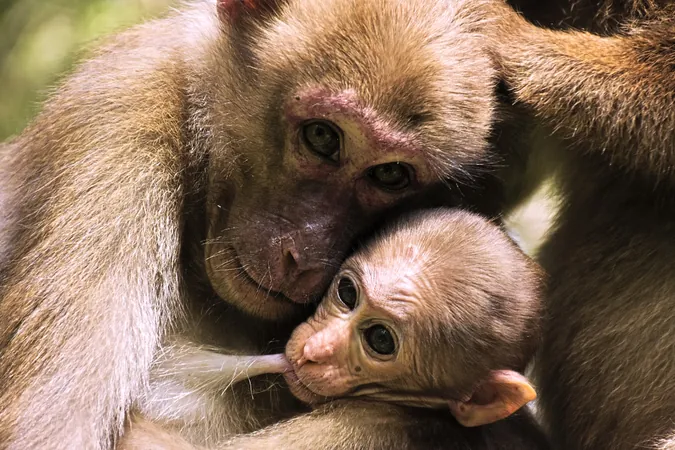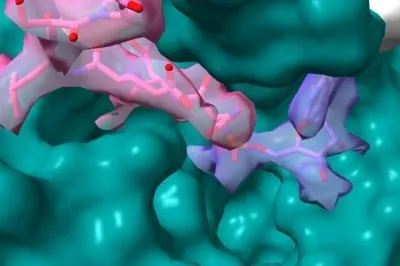
Shocking New Study Reveals the Long-Term Impact of Early Pregnancy Stress on Offspring
2025-01-22
Author: Li
A Groundbreaking Study
A groundbreaking long-term study has uncovered startling evidence that maternal stress during the early stages of pregnancy can drastically shape the stress response systems of offspring, even into adulthood. The research, conducted on wild Assamese macaques in Thailand by the University of Göttingen and the German Primate Center, suggests that stress hormones present during the first half of pregnancy exert a particularly profound influence.
Interestingly, stress hormones elevated later in pregnancy or post-birth do not produce the same long-lasting effects. This study, published in the esteemed journal Proceedings of the Royal Society B: Biological Sciences, highlights the critical role early life experiences play in shaping health trajectories under natural conditions.
The Critical Early Phase
The investigators focused on how maternal stress impacts the offspring's stress hormone system. Their findings revealed that exposure to maternal glucocorticoids—the body's primary stress hormones—during crucial organizational phases in the first half of pregnancy can significantly enhance the functioning of the hypothalamic-pituitary-adrenal (HPA) axis, the body's main stress response system.
Simone Anzá, a former doctoral student involved in the research, stated, "Our results show that the HPA-axis activity of offspring was enhanced in correlation with the adversity faced during early pregnancy, such as food shortages or social conflicts."
Observations in the Wild
Unlike traditional laboratory settings, this team conducted their observations in the monkeys' natural habitats over a remarkable nine-year period. Researchers collected fecal samples from pregnant females to measure glucocorticoid metabolites, providing insights into the environmental challenges the mothers faced—such as fluctuations in food availability and social dynamics. This data was then correlated with the stress hormone levels exhibited by their offspring at various developmental stages.
The implications of the findings were clear; offspring demonstrated elevated stress responses from infancy through adolescence and into adulthood, showcasing the enduring consequences of early maternal stress.
Previous analyses from the same research highlighted how prenatal stress correlates with altered growth patterns, unfavorable changes in gut microbiomes, and weakened immune responses. Such findings underline the extensive implications of a stressful environment during critical prenatal periods on various physiological systems.
Impacts on Health Research
Oliver Schülke, a scientist leading the study, remarked, “Our results underscore the importance of the timing of maternal stress hormone exposure during and after pregnancy. It is critical to note that not only catastrophic events but even minor fluctuations in environmental conditions can lead to significant impacts.”
This alarming research is not just applicable to animals; it has profound implications for human health. Evidence suggests that stress during early human pregnancy may increase the risk of stress-related disorders and immune deficiencies in children. The findings serve as a crucial reminder for expecting mothers to prioritize their mental health during pregnancy, as it may have lasting consequences on their children's well-being.
As more studies are conducted, the potential for targeted interventions to support maternal health and, consequently, child development becomes increasingly vital. The connection between maternal stress and offspring health is clearer than ever, prompting a greater focus on mental and emotional support for expectant mothers.




 Brasil (PT)
Brasil (PT)
 Canada (EN)
Canada (EN)
 Chile (ES)
Chile (ES)
 Česko (CS)
Česko (CS)
 대한민국 (KO)
대한민국 (KO)
 España (ES)
España (ES)
 France (FR)
France (FR)
 Hong Kong (EN)
Hong Kong (EN)
 Italia (IT)
Italia (IT)
 日本 (JA)
日本 (JA)
 Magyarország (HU)
Magyarország (HU)
 Norge (NO)
Norge (NO)
 Polska (PL)
Polska (PL)
 Schweiz (DE)
Schweiz (DE)
 Singapore (EN)
Singapore (EN)
 Sverige (SV)
Sverige (SV)
 Suomi (FI)
Suomi (FI)
 Türkiye (TR)
Türkiye (TR)
 الإمارات العربية المتحدة (AR)
الإمارات العربية المتحدة (AR)